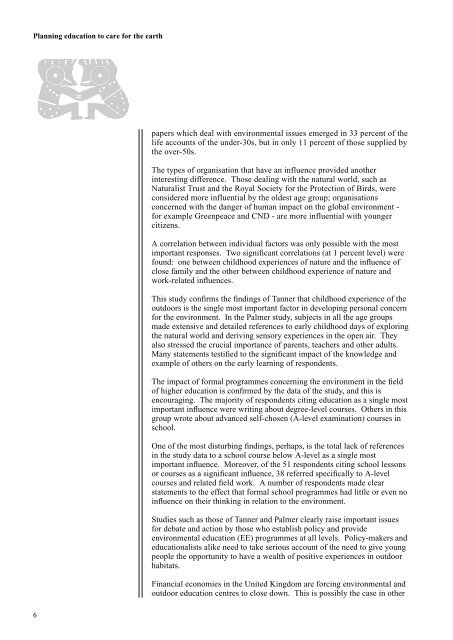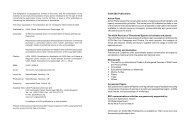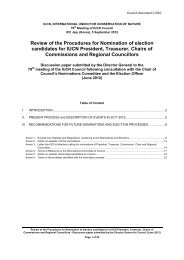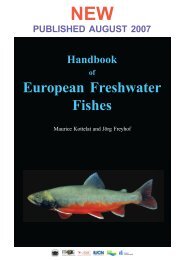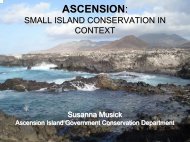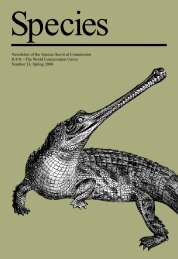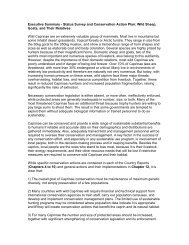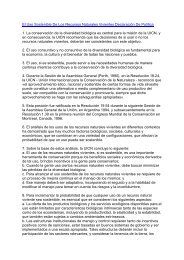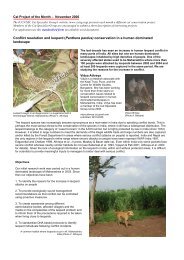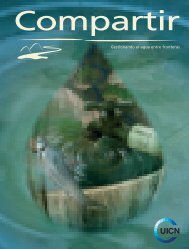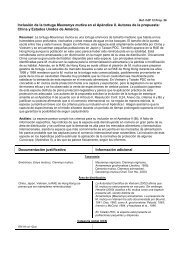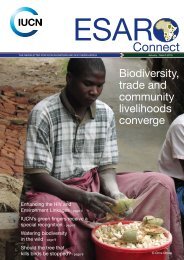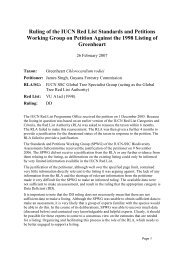Planning education to care for the earth - IUCN Knowledge Network
Planning education to care for the earth - IUCN Knowledge Network
Planning education to care for the earth - IUCN Knowledge Network
You also want an ePaper? Increase the reach of your titles
YUMPU automatically turns print PDFs into web optimized ePapers that Google loves.
<strong>Planning</strong> <strong>education</strong> <strong>to</strong> <strong>care</strong> <strong>for</strong> <strong>the</strong> <strong>earth</strong>papers which deal with environmental issues emerged in 33 percent of <strong>the</strong>life accounts of <strong>the</strong> under-30s, but in only 11 percent of those supplied by<strong>the</strong> over-50s.The types of organisation that have an influence provided ano<strong>the</strong>rinteresting difference. Those dealing with <strong>the</strong> natural world, such asNaturalist Trust and <strong>the</strong> Royal Society <strong>for</strong> <strong>the</strong> Protection of Birds, wereconsidered more influential by <strong>the</strong> oldest age group; organisationsconcerned with <strong>the</strong> danger of human impact on <strong>the</strong> global environment -<strong>for</strong> example Greenpeace and CND - are more influential with youngercitizens.A correlation between individual fac<strong>to</strong>rs was only possible with <strong>the</strong> mostimportant responses. Two significant correlations (at 1 percent level) werefound: one between childhood experiences of nature and <strong>the</strong> influence ofclose family and <strong>the</strong> o<strong>the</strong>r between childhood experience of nature andwork-related influences.This study confirms <strong>the</strong> findings of Tanner that childhood experience of <strong>the</strong>outdoors is <strong>the</strong> single most important fac<strong>to</strong>r in developing personal concern<strong>for</strong> <strong>the</strong> environment. In <strong>the</strong> Palmer study, subjects in all <strong>the</strong> age groupsmade extensive and detailed references <strong>to</strong> early childhood days of exploring<strong>the</strong> natural world and deriving sensory experiences in <strong>the</strong> open air. Theyalso stressed <strong>the</strong> crucial importance of parents, teachers and o<strong>the</strong>r adults.Many statements testified <strong>to</strong> <strong>the</strong> significant impact of <strong>the</strong> knowledge andexample of o<strong>the</strong>rs on <strong>the</strong> early learning of respondents.The impact of <strong>for</strong>mal programmes concerning <strong>the</strong> environment in <strong>the</strong> fieldof higher <strong>education</strong> is confirmed by <strong>the</strong> data of <strong>the</strong> study, and this isencouraging. The majority of respondents citing <strong>education</strong> as a single mostimportant influence were writing about degree-level courses. O<strong>the</strong>rs in thisgroup wrote about advanced self-chosen (A-level examination) courses inschool.One of <strong>the</strong> most disturbing findings, perhaps, is <strong>the</strong> <strong>to</strong>tal lack of referencesin <strong>the</strong> study data <strong>to</strong> a school course below A-level as a single mostimportant influence. Moreover, of <strong>the</strong> 51 respondents citing school lessonsor courses as a significant influence, 38 referred specifically <strong>to</strong> A-levelcourses and related field work. A number of respondents made clearstatements <strong>to</strong> <strong>the</strong> effect that <strong>for</strong>mal school programmes had little or even noinfluence on <strong>the</strong>ir thinking in relation <strong>to</strong> <strong>the</strong> environment.Studies such as those of Tanner and Palmer clearly raise important issues<strong>for</strong> debate and action by those who establish policy and provideenvironmental <strong>education</strong> (EE) programmes at all levels. Policy-makers and<strong>education</strong>alists alike need <strong>to</strong> take serious account of <strong>the</strong> need <strong>to</strong> give youngpeople <strong>the</strong> opportunity <strong>to</strong> have a wealth of positive experiences in outdoorhabitats.Financial economies in <strong>the</strong> United Kingdom are <strong>for</strong>cing environmental andoutdoor <strong>education</strong> centres <strong>to</strong> close down. This is possibly <strong>the</strong> case in o<strong>the</strong>r6


